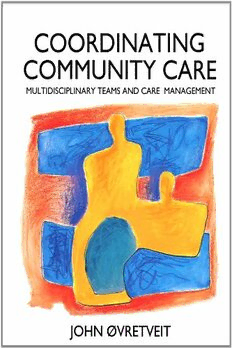Download Coordinating Community Care: Multidisciplinary Terms and Care Management. PDF Free - Full Version
Download Coordinating Community Care: Multidisciplinary Terms and Care Management. by John Ovretveit in PDF format completely FREE. No registration required, no payment needed. Get instant access to this valuable resource on PDFdrive.to!
About Coordinating Community Care: Multidisciplinary Terms and Care Management.
An exploration of how people from different professions and agencies work together to meet the health and social needs of people in a community. It is about making the most of different skills to meet people's needs and creating satisfying and supportive working groups. It is the details of making community care a reality. The effectiveness and quality of care a person receives depends on getting the right professionals and services, and also on the support given to the person's carers. Services must be co-ordinated if the person is to benefit, but co-ordination is more difficult with the increasing change, variety and complexity of health and social services in the 1990s. This book challenges the assumptions that services are best co-ordinated by multiprofessional and multi-agency teams, and that community care teams are broadly similar. It demonstrates when a team is needed and how to overcome differences between professions, and between agency policies and philosophies. Drawing on ten years of consultancy research with a variety of teams and services, the author gives practical guidance for managers and practitioners about how to set up and improve co-ordination and teamwork. The book combines practical concerns with theoretical depth drawing on organization and management theory, psychology, psychoanalysis, sociology, economics and government studies.
Detailed Information
| Author: | John Ovretveit |
|---|---|
| Publication Year: | 1993 |
| ISBN: | 335232485 |
| Pages: | 241 |
| Language: | English |
| File Size: | 23.917 |
| Format: | |
| Price: | FREE |
Safe & Secure Download - No registration required
Why Choose PDFdrive for Your Free Coordinating Community Care: Multidisciplinary Terms and Care Management. Download?
- 100% Free: No hidden fees or subscriptions required for one book every day.
- No Registration: Immediate access is available without creating accounts for one book every day.
- Safe and Secure: Clean downloads without malware or viruses
- Multiple Formats: PDF, MOBI, Mpub,... optimized for all devices
- Educational Resource: Supporting knowledge sharing and learning
Frequently Asked Questions
Is it really free to download Coordinating Community Care: Multidisciplinary Terms and Care Management. PDF?
Yes, on https://PDFdrive.to you can download Coordinating Community Care: Multidisciplinary Terms and Care Management. by John Ovretveit completely free. We don't require any payment, subscription, or registration to access this PDF file. For 3 books every day.
How can I read Coordinating Community Care: Multidisciplinary Terms and Care Management. on my mobile device?
After downloading Coordinating Community Care: Multidisciplinary Terms and Care Management. PDF, you can open it with any PDF reader app on your phone or tablet. We recommend using Adobe Acrobat Reader, Apple Books, or Google Play Books for the best reading experience.
Is this the full version of Coordinating Community Care: Multidisciplinary Terms and Care Management.?
Yes, this is the complete PDF version of Coordinating Community Care: Multidisciplinary Terms and Care Management. by John Ovretveit. You will be able to read the entire content as in the printed version without missing any pages.
Is it legal to download Coordinating Community Care: Multidisciplinary Terms and Care Management. PDF for free?
https://PDFdrive.to provides links to free educational resources available online. We do not store any files on our servers. Please be aware of copyright laws in your country before downloading.
The materials shared are intended for research, educational, and personal use in accordance with fair use principles.

